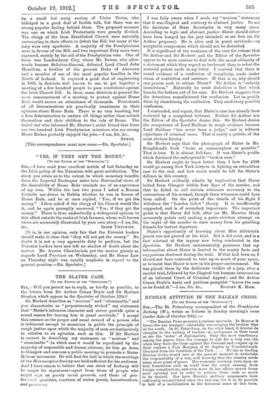THE SLATER CASE.
[To ME EDITOR OF THE "SPECTATOR."] SIR, —W ill you permit me to reply, as briefly as possible, to the letters from Sir Arthur Conan Doyle and Sir Herbert Stephen which appear in the Spectator of October 12th P
Sir Herbert describes as " noxious " and " abominable," and you characterize as " preposterously wicked" my statement that " Slater's infamous character and career provide quite a sound reason for leaving him in penal servitude." I accept this censure as the proper and usual reward of a person who is indiscreet enough to enunciate in public the principle of rough justice upon which the majority of men act instinctively in relation to an agitation such as this. If Sir Herbert is correct in describing my statement as " noxious " and " abominable " (in which case it would be repudiated by the majority of responsible and decent citizens), let him go down to Glasgow and convene a public meeting to promote a Slater Release movement. He will find the hall in which the meetings of the Microscopical Society are held sufficient for his audience. And I have reason to believe that one sheet of foolscap will be ample for signatures—apart from those of people who might sign on purely racial grounds, and those of pro- fessional gamblers, resetters of stolen jewels, housebreakers, and procurers. I was fully aware when I made my " noxious " statement that it was illogical and contrary to abstract justice. So are the decisions of State Secretaries in very many cases. According to logic and abstract justice Slater should either have been hanged (as the jury intended) or set free (as Sir Arthur proposes). He is alive and in penal servitude—an acceptable compromise which should not be disturbed.
It is significant of the weakness of the case for release that Sir Arthur and Sir Herbert and the Editor of the Spectator appear to be more anxious to deal with the moral obliquity of a statement which they regard as irrelevant than to rebut the material points made in my letter. I contend that there is sound evidence of a confession of complicity, made under stress of conviction and sentence. If that is so, why should any person seek to release Slater P Sir Arthur is " entirely incredulous." Naturally be must disbelieve a fact which knocks the bottom out of his case. Sir Herbert suggests that the detectives manufactured the confession. Let us gratify them by abandoning the confession. They need every possible confession.
I contended, and repeat, that Slater's case has already been reviewed by a competent tribunal. Neither Sir Arthur nor the Editor of the Spectator denies this. Sir Herbert denies the competence of Lord Haldane to weigh evidence because Lord Haldane "has never been a judge," and is without experience of criminal cases. That is surely a quibble of the most obvious fatuity.
Sir Herbert says that the photograph of Slater in Mr. Roughhead's book " looks as commonplace as possible." That is true. It is almost full-face. It was Slater's profile which disclosed the unforgettable " broken nose."
Sir Herbert ought to know better than I how far £100 would go among New York lawyers in fighting an extradition case to the end, and how much would be left for Slater's defence in this country.
Sir Herbert evidently admits by implication that Slater bolted from Glasgow within four days of the murder, and that he failed to call certain witnesses necessary to the contentions of his counsel, though these witnesses could have been called. On the point of the details of his flight I withdraw the "London ticket" theory. It is insufficiently supported, and is of secondary importance. The important point is that Slater did bolt, after (as Mr. Maurice Healy accurately points out) making a panic-stricken attempt on the night of the murder to raise money from his gambling friends for instant departure.
Slater's opportunity of knowing about Miss Gilchrist's jewels was not proved at his trial. But it did exist, and is a fact relevant at the inquiry now being conducted in the Spectator. Sir Herbert unwarrantably presumes that my information about Slater is limited to the scanty facts and suggestions disclosed during the trial. If that had been so, I should not have ventured to take up so much of your space, or to insist that Slater is now in his proper environment. He was placed there by the deliberate verdict of a jury, after a careful trial, followed by the illogical but humane intervention of an informal Court of Criminal Appeal ; and Sir Arthur Conan Doyle's hasty and partisan pamphlet " leaves the case as he found it."—I am, Sir, &c., ROBERT K. RISK.














































 Previous page
Previous page